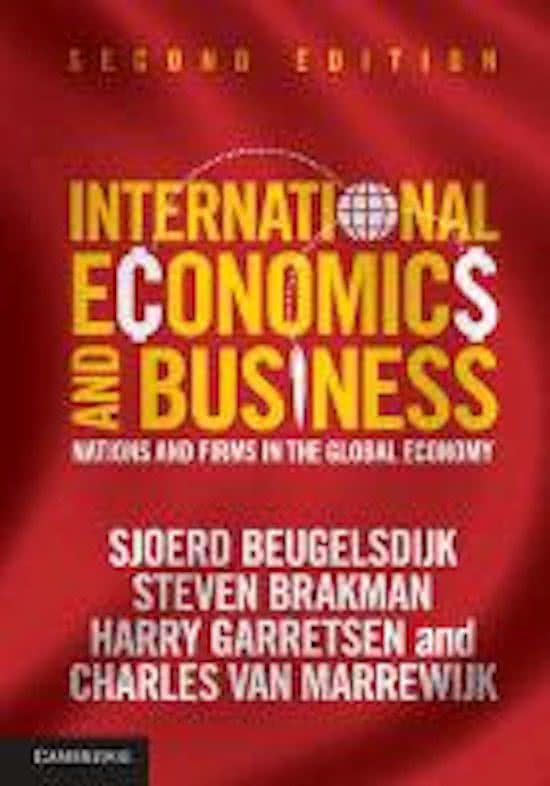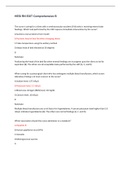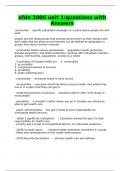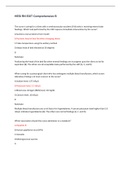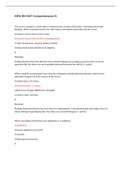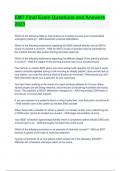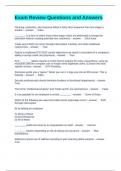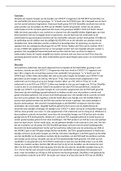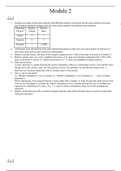Foreign Direct Investment, Trade & Geography
Bertine Niks
Lecture 1: Globalization – Definition, Dimensions
and Stylized Facts
1.4: What is the global economy?
Five key issues:
- Cultural globalization: whether there is a global culture or a set of
universal cultural variables, and the extent to which these displace
embedded national cultures and traditions.
o ‘McDonaldization’: the carriers of culture globalization are
argued to be MNE’s.
- Economic globalization: this centres on the decline of national
markets and the rise of global markets as the firm’s focal point, be it
for the production and sale of final and intermediate goods and
services or for the procurement of inputs (labour and capital). Driven
by changes in technology which permit new, complicated and more
efficient ways of internationally organizing production processes, the
rules of competition are redefined along the way and firms and
governments will have to learn how to adapt.
o Consequences of national economies the increased
interdependence of national economies, and the trend towards
greater integration of goods, labour and capital markets.
(Neary, 2003). Businesses play a key role: FDI and cross-
border acquisitions
- Geographical globalization: the sensation of compressed time and
space as a result of reduced travel times between locations and the
rapid exchange of info.
o Neo-liberals: ‘end of geography’ in which location no ,longer
matters and ‘footlose’ global capital can quickly cross borders.
o Porter (1990) and Krugman (1991): local production and their
intricate interconnections are required to gain a competitive
advantage.
- Institutional globalization: the spread of ‘universal’ institutional
arrangement across the globe.
o WTO: seeks to demolish international barriers to trade, and
promotes the free movement of factors of production.
- Political globalization: the relationship between the power of markets
and (multinational) firms versus the nation-state, which is
undergoing continuous change and updating in reaction to economic
and political forces.
o Globalization process is conditioned by: (financial) institutions,
dominant market players i.e. MNC’s and large investments
firms.
o Anti-globalists: large MNE’s become more and more powerful,
out-powering the majority of nation-states.
Economic globalization increased interdependence of national
economies and greater integration of goods, labour and capital markets.
- Not a new phenomenon
, Foreign Direct Investment, Trade & Geography
Bertine Niks
Globalization has many different dimensions:
- Cultural : Homogenization of cultural values
- Economic: Rise of global markets
- Geographic: Compressed time and space
- Institutional: Spread of universal institutional arrangements
- Political: Growing international cooperation and coordination.
2.2: Trade and multinational activity.
Trade = international purchases and sales of final goods/services and
intermediate goods.
• Inter-firm (between different firms)
• Intra-firm (between subsidiaries of the same firm)
Multinational activity = Establishment of foreign branches / acquisition
of foreign firms (ownership and control of operations of another country)
• Horizontal: Serving foreign markets directly (producing and selling to
customers abroad);
substitute for exporting.
• Vertical: Sourcing from abroad; substitute for importing.
Vertical multinational activity triggers a trade flow because goods
produced abroad are subsequently exported back to the home country.
Reason to start IB activities: they wish to sell products or services to
customers in a new market (generate value added). Two options:
- Produce at home, then export (Heineken).
- Produce in the foreign country, sell directly to local customers
(Honda US).
Vertical multinational activity only a part of the value chain is located in
another country, (i.e. the production) because that specific part of the
production process can be done more efficiently in that specific host
country, after this is done the product goes back to the home country.
Horizontal multinational activity a firm starts producing and selling
products or services to clients in a host country.
Bertine Niks
Lecture 1: Globalization – Definition, Dimensions
and Stylized Facts
1.4: What is the global economy?
Five key issues:
- Cultural globalization: whether there is a global culture or a set of
universal cultural variables, and the extent to which these displace
embedded national cultures and traditions.
o ‘McDonaldization’: the carriers of culture globalization are
argued to be MNE’s.
- Economic globalization: this centres on the decline of national
markets and the rise of global markets as the firm’s focal point, be it
for the production and sale of final and intermediate goods and
services or for the procurement of inputs (labour and capital). Driven
by changes in technology which permit new, complicated and more
efficient ways of internationally organizing production processes, the
rules of competition are redefined along the way and firms and
governments will have to learn how to adapt.
o Consequences of national economies the increased
interdependence of national economies, and the trend towards
greater integration of goods, labour and capital markets.
(Neary, 2003). Businesses play a key role: FDI and cross-
border acquisitions
- Geographical globalization: the sensation of compressed time and
space as a result of reduced travel times between locations and the
rapid exchange of info.
o Neo-liberals: ‘end of geography’ in which location no ,longer
matters and ‘footlose’ global capital can quickly cross borders.
o Porter (1990) and Krugman (1991): local production and their
intricate interconnections are required to gain a competitive
advantage.
- Institutional globalization: the spread of ‘universal’ institutional
arrangement across the globe.
o WTO: seeks to demolish international barriers to trade, and
promotes the free movement of factors of production.
- Political globalization: the relationship between the power of markets
and (multinational) firms versus the nation-state, which is
undergoing continuous change and updating in reaction to economic
and political forces.
o Globalization process is conditioned by: (financial) institutions,
dominant market players i.e. MNC’s and large investments
firms.
o Anti-globalists: large MNE’s become more and more powerful,
out-powering the majority of nation-states.
Economic globalization increased interdependence of national
economies and greater integration of goods, labour and capital markets.
- Not a new phenomenon
, Foreign Direct Investment, Trade & Geography
Bertine Niks
Globalization has many different dimensions:
- Cultural : Homogenization of cultural values
- Economic: Rise of global markets
- Geographic: Compressed time and space
- Institutional: Spread of universal institutional arrangements
- Political: Growing international cooperation and coordination.
2.2: Trade and multinational activity.
Trade = international purchases and sales of final goods/services and
intermediate goods.
• Inter-firm (between different firms)
• Intra-firm (between subsidiaries of the same firm)
Multinational activity = Establishment of foreign branches / acquisition
of foreign firms (ownership and control of operations of another country)
• Horizontal: Serving foreign markets directly (producing and selling to
customers abroad);
substitute for exporting.
• Vertical: Sourcing from abroad; substitute for importing.
Vertical multinational activity triggers a trade flow because goods
produced abroad are subsequently exported back to the home country.
Reason to start IB activities: they wish to sell products or services to
customers in a new market (generate value added). Two options:
- Produce at home, then export (Heineken).
- Produce in the foreign country, sell directly to local customers
(Honda US).
Vertical multinational activity only a part of the value chain is located in
another country, (i.e. the production) because that specific part of the
production process can be done more efficiently in that specific host
country, after this is done the product goes back to the home country.
Horizontal multinational activity a firm starts producing and selling
products or services to clients in a host country.

